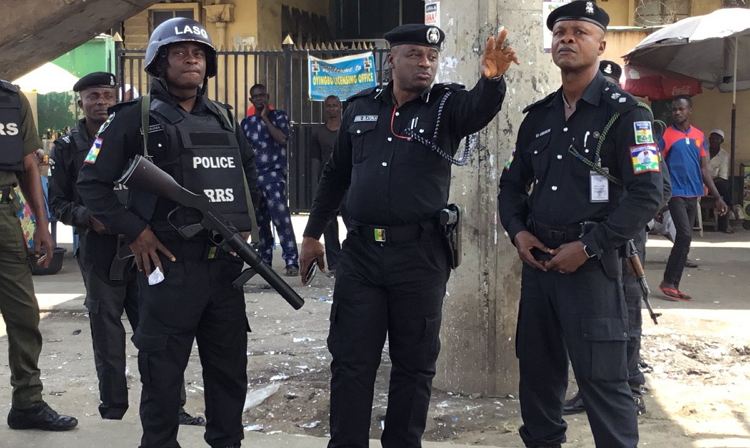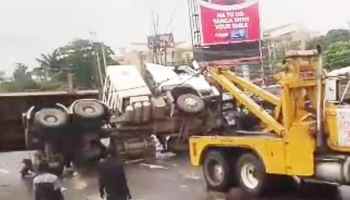Metro
12 Passengers Drowned Because of N300 Boat Fare – Police

The Lagos State Commissioner of Police, Hakeem Odumosu, on Tuesday, paraded a commercial boat helmsman, Bimbo Elebiju, for allegedly causing the death of 12 of his passengers while conveying them to their destinations.
The victims were said to have drowned after the wave of a ship sailing along the Kirikiri waterfront made the boat, which engine had been switched off during an argument between Bimbo and his passengers over the fare, to capsize.
Odumosu, while parading Bimbo at the command headquarters in Ikeja, said 20 passengers boarded the boat from Kirikiri to Badagry, but while on the way, the passengers disagreed with the helmsman on the fare.
Odumosu said Bimbo indicated that the fare was N1,500, but the passengers insisted on paying N1,200, adding that the helmsman switched off the engine of the boat by the waterfront because of the N300 difference in fare.
He stated that when the ship sailed along, the wave made the boat to drift towards a stationary barge, where it capsized, adding that Bimbo jumped into the water, abandoned his passengers and escaped.
While five passengers were rescued, the CP said 10 others drowned, adding that the rescued passengers gave an account of Bimbo’s action before the tragedy struck.
He said Bimbo was trailed and arrested, adding that he would be charged.
Odumosu stated, “On July 29, 2020, around 5.45pm, our marine operatives received a distress call that a commercial boat with the inscription: ‘Mount Zion Transport’, fitted with 150HP Yamaha outboard engine, which was conveying 20 passengers from Kirikiri to Badagry, drifted towards a stationary barge and capsized along the Kirikiri waterfront.
“Five passengers were rescued, while 12 corpses were recovered. Three people are still missing. The helmsman, Bimbo Elebiju, swam to safety. Investigation revealed that the accident was caused by the deliberate act of the helmsman. There was an argument between the deckhand and the passengers as to the transport fare.
“Bimbo insisted on N1,500 per passenger and the passengers said they would only pay N1,200 each. Because of the N300 difference, the helmsman turned off the engine on a turbulent waterfront. A big ship passed and stirred the water, creating a wave that made the boat to drift towards the stationary barge. The suspect was trailed to his hideout and arrested after the survivors of the accident gave the true account of what happened. He will be charged.”
The Punch
Metro
Beyond the Headlines: R2P, Sovereignty, and the Search for Peace in Nigeria

By Tolulope A. Adegoke, PhD
“In the face of complex crises, true leadership is measured not by the clarity of one’s critique, but by the courage to enact responsible solutions that bridge the gap between sovereign duty and our global responsibility to protect” – Tolulope A. Adegoke, PhD
If you follow global news, you have likely encountered alarming headlines about Nigeria. Terms like “religious violence” and even “genocide” are often used to describe a complex and devastating crisis. But beyond the headlines lies a critical international dilemma: when a state struggles to protect its own people, what is the world’s responsibility?
This is not a new question. It lies at the heart of a global principle adopted after the horrors of Rwanda and Srebrenica (Town in Bosnia and Herzegovina): The Responsibility to Protect (R2P).
Let us break down what R2P means, why it is so relevant in Nigeria, and what proposed international responses—like those from the United States—reveal about the difficult pursuit of peace in a complicated world.
R2P in a Nutshell: A Three-Pillar Promise
Imagine R2P as a three-legged stool, with each leg representing a fundamental obligation:
- Pillar I: The State’s Primary Duty. Every sovereign nation has the foremost responsibility to shield its populations from genocide, war crimes, ethnic cleansing, and crimes against humanity.
- Pillar II: International Assistance. The global community has a duty to assist states in building this protective capacity through aid, training, and diplomatic support.
- Pillar III: The Decisive Response. If a state is “manifestly failing” to protect its people, the international community must respond decisively—first through peaceful means like sanctions and diplomacy, and only as an absolute last resort, with authorized military force.
The protracted crisis in Nigeria tests this very framework to its limits.
The Nigerian Labyrinth: It’s More Complex Than It Seems
Labeling the situation in Nigeria as a simple religious war is a profound misunderstanding. The reality is a tangled web of several overlapping conflicts:
- Jihadist Insurgency: Groups like Boko Haram and ISWAP in the Northeast target both Muslims and Christians who oppose their rule. However, Christian communities have endured specific, brutal attacks on churches and schools, marking them for violence based on their faith.
- Clashing Livelihoods: In the fertile Middle Belt, competition over dwindling land and water resources has ignited violent clashes between predominantly Muslim Fulani herders and Christian farmers. Climate change and desertification have intensified this struggle, layering economic desperation over religious and ethnic identities.
- Criminal Banditry: Widespread kidnappings and violence in the Northwest, often driven by profit, exploit the fragile security situation, further destabilizing the region.
This intricate complexity is why the term “Christian genocide” is so hotly debated. While there is undeniable, systematic violence against Christians, the legal definition of genocide requires proof of a specific intent to destroy the group. Many analysts point to the confluence of political, economic, and criminal motives, arguing that the situation, while atrocious, may not meet this strict legal threshold.
The R2P Test: Is Nigeria “Manifestly Failing”?
A widespread perception holds that the Nigerian government is failing in its Pillar I responsibility. Despite possessing a powerful military, issues of corruption, a slow institutional response, and allegations of bias have left millions of citizens vulnerable.
This failure activates the world’s role under Pillar II. The United States, United Kingdom, and other partners have provided significant aid, military training, and intelligence sharing. Yet, it has not been enough. The persistent violence pushes the necessary conversation toward the more difficult Pillar III: the “Responsibility to Respond.”
The U.S. Proposition: A Case Study in Coercive Care
What does a “timely and decisive response” entail? Proposed U.S. actions offer a clear case study. Focusing on coercive measures short of force, they include:
- Targeted Sanctions: Visa bans and asset freezes against specific Nigerian officials accused of corruption or atrocities.
- Diplomatic Pressure: Officially designating Nigeria as a “Country of Particular Concern” for religious freedom.
- Conditioned Aid: Linking further military assistance to verifiable improvements in human rights and accountability.
The Pros and Cons: A Balanced View
- The Upside: These actions send a powerful message of solidarity to victims, potentially deter perpetrators, and uphold the global norm that national sovereignty entails a responsibility to protect, not a license for atrocity.
- The Downside: These measures are fiercely rejected by the Nigerian government and many within the country as a violation of sovereignty. There is a risk that cutting military aid could weaken the fight against Boko Haram and ISWAP, and a narrow focus on the religious dimension could oversimplify the conflict’s root causes, potentially inflaming tensions further.
Key Takeaways for a Global Audience
This situation is not merely a problem for politicians; it offers critical lessons for all of us:
- For Global Citizens: Seek nuanced understanding. Effective advocacy requires moving beyond simplistic labels to grasp the underlying root causes—such as climate change, governance failures, and economic despair—that fuel the violence.
- For Businesses Operating Abroad: You have a vital role to play. Conduct human rights due diligence and use your economic influence to support stability, conflict resolution, and ethical practices within your operations and supply chains.
- For the International Community: This case exposes R2P’s greatest weakness: its reliance on a UN Security Council often paralyzed by geopolitics. The future demands more robust and empowered regional leadership from bodies like the African Union.
Conclusion: An Unfinished Conversation for Lasting Peace
The crisis in Nigeria and the proposed international responses are not about easy answers. They represent the difficult, ongoing work of making the promise of “Never Again” a tangible reality.
R2P remains an unfulfilled ideal, caught between the urgent need to protect human life and the complex realities of national sovereignty. The conversation it forces is itself a constructive step forward. It challenges Nigeria to reclaim its primary duty to protect all its citizens, challenges the world to move beyond rhetoric to meaningful action, and challenges us all to remember that our common humanity is the most important border we share. The demand for peace, both within Nigeria and beyond, requires nothing less than our collective and unwavering commitment.
Dr. Tolulope A. Adegoke, AMBP-UN is a Doctor of Philosophy (PhD) in History and International Studies, Fellow Certified Management Consultant & Specialist, Fellow Certified Human Resource Management Professional, a Recipient of the Nigerian Role Models Award (2024), and a Distinguished Ambassador For World Peace (AMBP-UN). He has also gained inclusion in the prestigious compendium, “Nigeria @65: Leaders of Distinction”.
Metro
HURIWA Demands Probe As Nine Soldiers Accused of Links to Boko Haram Allegedly Escape from Custody

A major security breach has hit the Nigerian military after nine soldiers reportedly escaped from a guardroom at Maimalari Cantonment, Maiduguri — headquarters of the Army’s 7 Division.
Military sources said the incident occurred around 2:15am on Monday.
Most of the escapees were said to have been detained for alleged links with Boko Haram and involvement in arms trafficking in the North-East.
“There was a jailbreak on Monday around 0215 hours at Maimalari Cantonment. Nine personnel detained mostly for dealing in arms running with terrorists escaped,” a source, according to some media reports, confirmed.
One of the fugitives has since been recaptured, while a manhunt is underway for the remaining eight.
The military has reportedly launched an internal probe to uncover how the soldiers succeeded in breaking free from the high-security facility.
Meanwhile, a pro-democracy and civil rights advocacy group – Human Rights Writers Association (HURIWA) of Nigeria has condemned the criminal activity of letting out such high value suspects at a time that the nation is gripped by the threats of the United States of America government’s threats to unleash military airstrikes targeting Islamic Terrorists like Boko Haram terrorists and ISWAP.
HURIWA believes that if the report is factually accurate, then there is more to it than meets the eyes. It means that there is a high network of conspiratorial plots from the topmost echelons of the command structures and these collaborators and saboteurs of the war on terror must be identified, arrested, prosecuted for treason and jailed for life.
HURIWA tasked the Chief of Defence Staff, General Olufemi Oluyede and the Chief of Army Staff, Lieutenant General Waidi Shaibu to take the matter as a high priority case and to go after the escapees just as the commander charged with securing their detention should be immediately suspended and all those who participated in aiding and abetting their disappearances must be arrested and prosecuted for sabotaging the counter terrorism war in Nigeria.
“If this is true, it means that the claims made by the Borno state governor, Professor Babagana Umara Zulum, of the existence of saboteurs of the war on terror within the Nigeria Army is much deeper than we are all contemplating.”
The Rights group stated that although the Nigerian Army is yet to react to the development at the time the media filed this report, the escapees were alleged to be involved in arms trafficking to terrorist groups operating in Nigeria’s North-East just as it was gathered that reports of the jailbreak have led to serious concerns within Nigeria’s security sector.
HURIWA expressed disappointment that saboteurs embedded within the nation’s military circles orchestrated the ugly development just few days after President Bola Tinubu appointed new service chiefs as a way to pass a message that they are invincible but the civil rights advocacy group stated that allowing these important and strategic suspects who sabotaged the war on terror to escape without being caught on time, it therefore means that there is the urgency of the moment to review the entire spectrum of military operations against Boko Haram terrorists given that their informants and suppliers of weapons have successfully penetrated the military institution, which is a very big shame.
“When we call for heads to roll, we truly mean that many bad eggs must be immediately weeded out of the Army given that they are actually undermining the National security of the corporate entity of Nigeria. It is time for a transparent overhauling of the security operations against terrorists in the country.”
Metro
Traffic Officials Avert Tragedy As Gas Tanker Overturns in Lagos

A gas-laden tanker overturned on a Lagos road on Monday after the driver reportedly lost control of the vehicle.
The General Manager (GM), Lagos State Traffic Management Authority (LASTMA), Mr. Olalekan Bakare-Oki, who made this known in a statement on Monday in Lagos, said that timely response of traffic officials, however, averted an explosion at the scene.
He said the incident occurred along the main carriageway at Chisco, before the traffic light inward Victoria Island area.
“Preliminary investigations indicate that the incident occurred when the driver of the truck, fully loaded with Compressed Natural Gas (CNG) cylinders, lost control of the vehicle, causing it to overturn on the busy expressway.
“Given the highly volatile nature of the product, the situation posed an immediate and severe threat to human life and property, necessitating urgent technical intervention,” he said.
The GM said that LASTMA personnel swiftly cordoned off the affected area upon arriving at the scene, securing both the overturned vehicle and the CNG tanks.
According to him, this was done to prevent any leakage or ignition that could have triggered an explosive conflagration.
Bakare-Oki said that the LASTMA Rescue and Emergency Unit immediately activated a multi-agency emergency protocol, summoning key responders.
“The responders are the Lagos State Fire and Rescue Service, the Lekki Concession Company (LCC), the Nigeria Police Force, and the Standards Organisation of Nigeria (SON).
“Through this rapid inter-agency collaboration, the imminent threat was expertly contained, and normalcy was swiftly restored,” he said.
Bakare-Oki, who was physically present at the scene, lauded the prompt and disciplined conduct of his officers and partner agencies.
He disclosed that the upturned gas tanker was professionally recovered, using state-of-the-art heavy-duty cranes and recovery equipment mobilised to the site.
“Their immediate action in securing the environment prevented what could have been an unspeakable tragedy.
“We ensured that the recovery process was conducted under the highest safety protocols to eliminate any residual risk,” he said.
He further revealed that additional LASTMA personnel were deployed to the area to manage the resultant traffic congestion.
He added that the team guaranteed the safety of commuters navigating through the Victoria Island corridor.
“While the main carriageway was closed temporarily from Chisco inward Victoria Island, motorists were immediately diverted through the new coastal road and reconnected via Bar Beach.
“This ensured the continuity of vehicular movement till the recovery operation was safely concluded and the road reopened to normal traffic,” he said.
The GM emphasised that the incident underscored the critical importance of adherence to road safety regulations, especially among truck drivers and operators of articulated vehicles transporting flammable and hazardous materials.
He admonished such operators to strictly observe prescribed speed limits, maintain their vehicles in sound mechanical condition, and exercise heightened vigilance, particularly under wet weather conditions.






